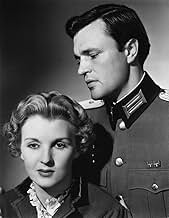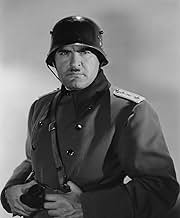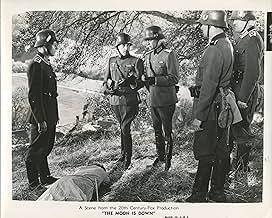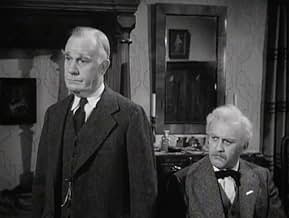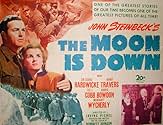अपनी भाषा में प्लॉट जोड़ेंDuring the Nazi occupation of Norway, a small Norwegian village struggles to cope with the invaders and some locals choose collaboration while others prefer armed resistance.During the Nazi occupation of Norway, a small Norwegian village struggles to cope with the invaders and some locals choose collaboration while others prefer armed resistance.During the Nazi occupation of Norway, a small Norwegian village struggles to cope with the invaders and some locals choose collaboration while others prefer armed resistance.
- निर्देशक
- लेखक
- स्टार
- पुरस्कार
- कुल 6 जीत
Cedric Hardwicke
- Col. Lanser
- (as Sir Cedric Hardwicke)
Frederic Brunn
- German Soldier
- (as Frederick Brunn)
Ernst Deutsch
- Maj. Hunter
- (as Ernest Dorian)
Ludwig Donath
- Hitler's Voice
- (as Louis Donath)
Richard Abbott
- Villager
- (बिना क्रेडिट के)
Louis V. Arco
- Schumann
- (बिना क्रेडिट के)
Georgia Backus
- Villager
- (बिना क्रेडिट के)
John Banner
- Lt. Prackle
- (बिना क्रेडिट के)
Trevor Bardette
- Knute Pierson - Foreman
- (बिना क्रेडिट के)
फ़ीचर्ड समीक्षाएं
This movie is based on one of John Steinbeck's lesser-known novels. I have a feeling that Steinbeck wrote the novel for much the same reason that the movie was made: Propaganda in support of the War.
Nunnally Johnson wrote the play for the movie, based on Steinbeck's novel, just as he had written the screenplay for Steinbeck's The Grapes of Wrath (1940). Nunnaly's wife, Dorris Bodon, had an acting role of both of these movies. The movie's director, Irving Pichel, had a small unaccredited role, here, as the Inn Keeper. Natalie Wood made her first screen appearance in this movie and then went on to make her 2nd, 3rd and 4th movie appearances in Irving Pichel-directed movies: Happy Land (1943), Tomorrow Is Forever, (1943), and The Bride Wore Boots (1946).
This movie is not so much star-oriented as it is character–oriented, with great character actors taking on the main roles. Cedric Hardwick plays Col Lanser, the coy and pragmatic Nazi officer who is assigned to take over a small Norwegian mining village for it rich iron mines. After the German victory, the village historian, Dr. Winter (Lee J. Cobb), acerbically jokes with its mayor, Orden (Henry Travers), that the German victory only took 4 hours and the victory was announced before anyone know there was even a battle.
The "victory" takes place as hundreds of German paratroopers are dropped into the small village while its tiny militia is enjoying a picnic and shooting contest in the country. The picnic had been arranged by the local store keeper, George Corell (E.J. Ballantine), with the hope that he will be quickly advanced up the German ranks and sent to Berlin.
When Col Lanser interviews Dr. Winter, the mayor, and his wife, Sarah (Margaret Wycherly), they are outraged by Corell's treachery. When Lanser tells Orden that the miners must work harder to supply iron for Germany, Odren tells him that Germans do not understand the people they conquer--they never have, and they never will. Free people do not take orders from a dictator, they live to be free and their freedom is build around an idea—not an order from a dictator. Just as Odren says, the people of the village are not easily pushed around. It is easier to conquer a country in battle than it is to occupy it by telling its free people what they MUST do to stay alive.
The movie demonstrates this and it also has scenes that demonstrate that soldiers are trained to fight and win territory–not to manage the people they have vanquished. Not only do the Norwegians slow down their work in the mines, they also commit acts of sabotage on those mines, and engage in other acts of resistance against the Germans who occupy them. This only increases as the RAF drops parachuted packets of dynamite to help them with these many "small" acts of resistance such as blowing up bridges and roads and other means of production and distribution of the mined iron that is to be used by Nazis in their war.
In the end, the German soldiers grow tired of being hated by the locals and guarding against their acts of resistance rather than fighting wars. This is demonstrated when one soldier, Lt. Tonder (Peter van Eyck), tries to just enjoy the simple company of one Norwegian woman, Molly Morden (Dorris Bowdon). Though she is lonely and is very hungry— food is being withheld from the families in order to feed the soldiers and iron miners—she remembers that Tonder was responsible for killing her husband. So, she stabs Tonder to death with a pair of scissors then manages to escape to Sweden.
In the end, "the flies conquer the flypaper."
Nunnally Johnson wrote the play for the movie, based on Steinbeck's novel, just as he had written the screenplay for Steinbeck's The Grapes of Wrath (1940). Nunnaly's wife, Dorris Bodon, had an acting role of both of these movies. The movie's director, Irving Pichel, had a small unaccredited role, here, as the Inn Keeper. Natalie Wood made her first screen appearance in this movie and then went on to make her 2nd, 3rd and 4th movie appearances in Irving Pichel-directed movies: Happy Land (1943), Tomorrow Is Forever, (1943), and The Bride Wore Boots (1946).
This movie is not so much star-oriented as it is character–oriented, with great character actors taking on the main roles. Cedric Hardwick plays Col Lanser, the coy and pragmatic Nazi officer who is assigned to take over a small Norwegian mining village for it rich iron mines. After the German victory, the village historian, Dr. Winter (Lee J. Cobb), acerbically jokes with its mayor, Orden (Henry Travers), that the German victory only took 4 hours and the victory was announced before anyone know there was even a battle.
The "victory" takes place as hundreds of German paratroopers are dropped into the small village while its tiny militia is enjoying a picnic and shooting contest in the country. The picnic had been arranged by the local store keeper, George Corell (E.J. Ballantine), with the hope that he will be quickly advanced up the German ranks and sent to Berlin.
When Col Lanser interviews Dr. Winter, the mayor, and his wife, Sarah (Margaret Wycherly), they are outraged by Corell's treachery. When Lanser tells Orden that the miners must work harder to supply iron for Germany, Odren tells him that Germans do not understand the people they conquer--they never have, and they never will. Free people do not take orders from a dictator, they live to be free and their freedom is build around an idea—not an order from a dictator. Just as Odren says, the people of the village are not easily pushed around. It is easier to conquer a country in battle than it is to occupy it by telling its free people what they MUST do to stay alive.
The movie demonstrates this and it also has scenes that demonstrate that soldiers are trained to fight and win territory–not to manage the people they have vanquished. Not only do the Norwegians slow down their work in the mines, they also commit acts of sabotage on those mines, and engage in other acts of resistance against the Germans who occupy them. This only increases as the RAF drops parachuted packets of dynamite to help them with these many "small" acts of resistance such as blowing up bridges and roads and other means of production and distribution of the mined iron that is to be used by Nazis in their war.
In the end, the German soldiers grow tired of being hated by the locals and guarding against their acts of resistance rather than fighting wars. This is demonstrated when one soldier, Lt. Tonder (Peter van Eyck), tries to just enjoy the simple company of one Norwegian woman, Molly Morden (Dorris Bowdon). Though she is lonely and is very hungry— food is being withheld from the families in order to feed the soldiers and iron miners—she remembers that Tonder was responsible for killing her husband. So, she stabs Tonder to death with a pair of scissors then manages to escape to Sweden.
In the end, "the flies conquer the flypaper."
This movie has no big-box office stars, nor a major director. Yet it tells its story effectively and, sometimes, in a deeply moving fashion, because the script is good and the actors, accustomed to playing character roles, make real individuals out of their assignments.
The movie starts off by establishing several points: 1) Norway fell fast to the Germans not because they were weak or pro-Nazi, but because they were betrayed from the inside by fifth columnists (Quislings), a fear that runs through several wartime U.S. movies (Keeper of the Flame is perhaps the best of those.) 2) The Norwegians are decent people, and therefore worth helping. The town's militia refuse to shoot at the German paratroopers as they are falling through the sky because "you're not supposed to do that," even though the Germans promptly slaughter the militia from hidden positions.
This could be compared to American movie presentations of the fall of France, in which the French are not portrayed as having been betrayed from the inside - though in fact they were, to an extent, by Pétain. That may, at least in part, be because the American government maintained diplomatic relations of a sort with the Vichy government until the Germans finally invaded formerly "Free France" in the hope of winning them over, with the result that Pétain could not be portrayed as the traitor he really was.
This is a fine movie, worth watching.
The movie starts off by establishing several points: 1) Norway fell fast to the Germans not because they were weak or pro-Nazi, but because they were betrayed from the inside by fifth columnists (Quislings), a fear that runs through several wartime U.S. movies (Keeper of the Flame is perhaps the best of those.) 2) The Norwegians are decent people, and therefore worth helping. The town's militia refuse to shoot at the German paratroopers as they are falling through the sky because "you're not supposed to do that," even though the Germans promptly slaughter the militia from hidden positions.
This could be compared to American movie presentations of the fall of France, in which the French are not portrayed as having been betrayed from the inside - though in fact they were, to an extent, by Pétain. That may, at least in part, be because the American government maintained diplomatic relations of a sort with the Vichy government until the Germans finally invaded formerly "Free France" in the hope of winning them over, with the result that Pétain could not be portrayed as the traitor he really was.
This is a fine movie, worth watching.
If you are looking for a realistic portrayal of WWII and the German occupation of Norway, perhaps this isn't the best film ("The Heroes of Telemark" is probably better for that). This is NOT a criticism of "The Moon is Down"...in fact it's a very good film and did its job of inspiring the American people during WWII.
The film is set in Norway just before the German invasion of 1940. The townspeople in a small mining town are all happy and oblivious to the coming stampede. Soon Nazis flood the country and their leader in the town (Cedric Hardwicke) has one goal...total obedience from the people. To do so, they'll kill as many people as they need to in order to keep the iron mine opening and running at capacity. But the locals cannot stand their new German overlords and throughout the film, they work to undermine the occupiers...even at the risk of their lives. This all leads to a VERY rousing finale-- one that still packs a powerful punch today.
This Twentieth Century Fox film is interesting because it shows the Germans as being brutal...but no more so than they actually were in their occupied territories! Instead of focusing too much on this, the movie really centers on the resistance of the Norwegians. An inspiring and well made film based on a story from John Steinbeck of all people. Well worth seeing.
The film is set in Norway just before the German invasion of 1940. The townspeople in a small mining town are all happy and oblivious to the coming stampede. Soon Nazis flood the country and their leader in the town (Cedric Hardwicke) has one goal...total obedience from the people. To do so, they'll kill as many people as they need to in order to keep the iron mine opening and running at capacity. But the locals cannot stand their new German overlords and throughout the film, they work to undermine the occupiers...even at the risk of their lives. This all leads to a VERY rousing finale-- one that still packs a powerful punch today.
This Twentieth Century Fox film is interesting because it shows the Germans as being brutal...but no more so than they actually were in their occupied territories! Instead of focusing too much on this, the movie really centers on the resistance of the Norwegians. An inspiring and well made film based on a story from John Steinbeck of all people. Well worth seeing.
"Haven't we some little right to life?"
To that question by one of the characters in the Nazi-conquered Norwegian town, actually, no, not when governments say "Fight. Destroy. Kill."
When governments say "You must have a number" and "You must carry this card embossed with that number" or "You must wear this uniform" and "You must kill that other human being," you are being considered as property, and that means you no longer have rights.
At least that is how governments want you to believe.
You are expected to obey, not think. Obey, not have desires of your own. You are a cog in the great machinery of the state.
"The Moon Is Down" was intended specifically as anti-Nazi propaganda, coming as it did shortly after the United States entered World War II, but there is a deeper and more universal meaning.
Even Nazis, or at least German soldiers lured or forced into war by German leaders of the National Socialist German Workers Party, or Nazis, have some vestiges of humanity -- at least some of them.
Told their lives belong to the state, to the fatherland, and that they must act, even die, for purposes of the Master Race, and not to think of or for themselves, still sometimes selfish desires rise to the fore, and such basics as love or freedom motivate more than do orders.
Death and destruction are inevitable results of the subordination of individuals and individuality to the state, to the society, to the race.
Humanity's bloodiest century, the twentieth, proved the truth of that statement with the rise of Nazism and Communism, both of which demanded the submersion of individuals into the mass.
When individual humans no longer matter, mass murders become mere matters of strategy, or "the continuation of politics by other means," as von Clausewitz is quoted.
Few movies illustrate the horror and degradation of war and governments better than "The Moon Is Down," which was presented on Turner Classic Movies the night of 2 January 2017. I had read the John Steinbeck book decades ago and not appreciated that message, not even seen it, that early in my life.
Now, though, after long years lived with the threat of war or some act of tyranny hanging over me nearly every day of that time, I do appreciate the tale and its moral, or at least the moral I now see.
Steinbeck wrote this, a good summation of the meaning of "The Moon Is Down": "Free men cannot start a war, but once it is started, they can fight on in defeat. Herd men, followers of a leader, cannot do that, and so it is always the herd men who win battles and the free men who win wars."
We are engaged on a daily basis in an ongoing war of individualism versus a leader, versus the mob, versus the collective, versus the state, or, especially these last few decades, versus a murderous and destructive movement some try to call a religion.
I would like to recommend "The Moon Is Down" in both book and movie form, not for entertainment, since there is no joy or pleasure in either, but for the object lesson: Do not let politicians and governments control your life.
To that question by one of the characters in the Nazi-conquered Norwegian town, actually, no, not when governments say "Fight. Destroy. Kill."
When governments say "You must have a number" and "You must carry this card embossed with that number" or "You must wear this uniform" and "You must kill that other human being," you are being considered as property, and that means you no longer have rights.
At least that is how governments want you to believe.
You are expected to obey, not think. Obey, not have desires of your own. You are a cog in the great machinery of the state.
"The Moon Is Down" was intended specifically as anti-Nazi propaganda, coming as it did shortly after the United States entered World War II, but there is a deeper and more universal meaning.
Even Nazis, or at least German soldiers lured or forced into war by German leaders of the National Socialist German Workers Party, or Nazis, have some vestiges of humanity -- at least some of them.
Told their lives belong to the state, to the fatherland, and that they must act, even die, for purposes of the Master Race, and not to think of or for themselves, still sometimes selfish desires rise to the fore, and such basics as love or freedom motivate more than do orders.
Death and destruction are inevitable results of the subordination of individuals and individuality to the state, to the society, to the race.
Humanity's bloodiest century, the twentieth, proved the truth of that statement with the rise of Nazism and Communism, both of which demanded the submersion of individuals into the mass.
When individual humans no longer matter, mass murders become mere matters of strategy, or "the continuation of politics by other means," as von Clausewitz is quoted.
Few movies illustrate the horror and degradation of war and governments better than "The Moon Is Down," which was presented on Turner Classic Movies the night of 2 January 2017. I had read the John Steinbeck book decades ago and not appreciated that message, not even seen it, that early in my life.
Now, though, after long years lived with the threat of war or some act of tyranny hanging over me nearly every day of that time, I do appreciate the tale and its moral, or at least the moral I now see.
Steinbeck wrote this, a good summation of the meaning of "The Moon Is Down": "Free men cannot start a war, but once it is started, they can fight on in defeat. Herd men, followers of a leader, cannot do that, and so it is always the herd men who win battles and the free men who win wars."
We are engaged on a daily basis in an ongoing war of individualism versus a leader, versus the mob, versus the collective, versus the state, or, especially these last few decades, versus a murderous and destructive movement some try to call a religion.
I would like to recommend "The Moon Is Down" in both book and movie form, not for entertainment, since there is no joy or pleasure in either, but for the object lesson: Do not let politicians and governments control your life.
In a small Norwegian mining town where all the signs are in English, the Nazis invade, under the command of Cedric Hardwicke. Gradually, their cruel policies lead to the rising of the townsmen in The Moon is Down, based on a novel by John Steinbeck.
Director Irving Pichel -- he has a small part as an innkeeper -- works from a low-key script by Nunnally Johnson, and the entire film is played in an engagingly low-key fashion by Hardwicke, the inimitable Henry Travers as the town's mayor, and Lee J. Cobb as the mayor's friend. It's an effective propaganda film from 20th Century-Fox right in the middle of the U.S.'s war.
Director Irving Pichel -- he has a small part as an innkeeper -- works from a low-key script by Nunnally Johnson, and the entire film is played in an engagingly low-key fashion by Hardwicke, the inimitable Henry Travers as the town's mayor, and Lee J. Cobb as the mayor's friend. It's an effective propaganda film from 20th Century-Fox right in the middle of the U.S.'s war.
क्या आपको पता है
- ट्रिवियाFilmed on the same sets used for the Welsh mining village in How Green Was My Valley (1941).
- गूफ़Most of the German soldiers are wearing WWI-style Stahlhelm helmets, not the WWII version used from 1935 on. Also, paratroopers (Fallschirmjagers) are shown, but none of the German troops are wearing their helmet - without the projecting visor and flared rim.
- भाव
Lt. Tonder: Last night I dreamed that Hitler was crazy!
- क्रेज़ी क्रेडिटOpening credits are shown with a hand gesturing to a map of Norway, indicating what is about to take place in the film.
टॉप पसंद
रेटिंग देने के लिए साइन-इन करें और वैयक्तिकृत सुझावों के लिए वॉचलिस्ट करें
- How long is The Moon Is Down?Alexa द्वारा संचालित
विवरण
- रिलीज़ की तारीख़
- कंट्री ऑफ़ ओरिजिन
- भाषा
- इस रूप में भी जाना जाता है
- Se ha puesto la luna
- फ़िल्माने की जगहें
- उत्पादन कंपनी
- IMDbPro पर और कंपनी क्रेडिट देखें
- चलने की अवधि1 घंटा 30 मिनट
- रंग
- पक्ष अनुपात
- 1.37 : 1
इस पेज में योगदान दें
किसी बदलाव का सुझाव दें या अनुपलब्ध कॉन्टेंट जोड़ें


